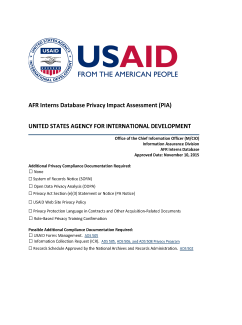Privacy Impact Assessment (PIA) Summary
In sub‐Saharan Africa, USAID works to help build sustained and well‐governed states that respond to the needs of their people, reduce widespread poverty, and conduct themselves responsibly in the international system. Our assistance to Africa aims to help African governments, institutions, and organizations advance good governance principles and innovative approaches to health, education, economic growth, agriculture, and the environment.
The summer intern program exposes American citizens to international development and promotes cross‐cultural understanding while providing student with an opportunity to experience work with USAID. Interns will have the opportunity to contribute to USAID's work in Africa while learning valuable lessons about international development and working closely with our staff members. The work assigned to an intern in most office divisions includes research, writing program memoranda, drafting documents, facilitating meetings and special events, attending program discussions in the Agency and at the Department of State, and communicating on program issues for USAID field Missions abroad. This is an excellent opportunity for outstanding students interested in pursuing careers in international development.
USAID's Africa Bureau hosts a limited number of summer interns in some of our overseas missions in sub‐Saharan Africa as well as in Washington, D.C. Students apply online at the USAID web site through an applicant database developed by M/CIO for Africa Bureau several years ago. The online application form asks for basic information as well as a description of foreign language skills and overseas experience. Student applicants are also asked to submit a statement of intent, and resume (or CV) online. The statement of intent discusses the students' interest in development and indicates how the internship fits into their career goals. The application is open for applications for a limited timeframe, usually 2 months (November‐December). After submitting an application, student applicants receive an email with a confirmation notice and a unique code. Professors will use this code to access the application site and upload their letters of recommendation directly, without being able to view the application. The application is administered by AFR/DP in collaboration with CIO. AFR/DP director is the only administrator who controls access to view applications through an individually granted password protected login system.

